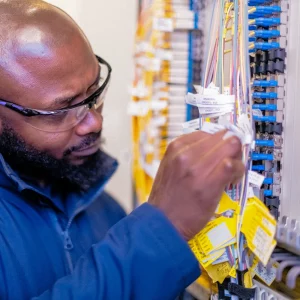Sponsored Links
UPDATE Digital Britain Reactions UK ISP Industry Comments
Posted: 30th Jan, 2009 By: MarkJ
Since yesterdays publication of Lord Carter's interim Digital Britain Review 2009 we've been inundated with comments from the wider UK ISP industry. Most are broadly welcoming of the proposals, although some have echoed conerns and others don't think the government has gone far enough. We've posted a simple summary of these remarks below:
Naturally we also wrote our own take on the three relevant areas of yesterdays report:
Some more comments coming in:
Felix Geyr, Managing Director of Be Broadband, said: "We welcome anything that raises the quality of broadband services. Being the pioneer of ADSL2+ in the UK, Be welcomes the opportunity to be a part of the new strategy group to work out how next generation, high speed internet is paid for. Be continues to invest in its own research to find ways of providing ever higher speeds and we look forward to helping develop the proposals the Government has outlined."
The Communications Consumer Panel (formerly Ofcom Consumer Panel), said: "We recently presented research to Lord Carter and the Digital Britain steering group that revealed what peoples future needs are likely to be in the communications market, and how policy makers can meet them. We highlighted four key points that we wanted Digital Britain to tackle, among others":
- universal service at a level that provides access to digital services that are considered important by consumers and citizens
- a joined-up information, advisory and problem solving capability to help in purchasing and trouble-shooting
- a clear commitment and improved record on government and industry privacy and security issues
- simpler and more automatic privacy and security mechanisms that help consumers/citizens to take responsibility.
Brett Johnson, Vice President of business development at AboveNet (fibre optic provider), said: "The Carter report is a step forward for a better connected Digital Britain but the focus for fibre connectivity really should start with the business community. There is still a long way to go in terms of providing adequate connectivity to businesses before we can even imagine delivery to the home.
Connection speeds do not just affect home broadband, but also cause problems for UK businesses. The need for speed means that the UK is fast approaching a capacity crunch. The worst case scenario will see networks Internet grinding to a halt, with untold affect on business productivity and competitiveness. To date, there are many buildings in Central London that are not connected via fibre, but the opportunity and infrastructure is already there and ready to connect.
The only answer to limitless capacity and future-proof networks is dedicated end-to-end optical-fibre metro networks. There are no exchanges involved and hence the connectivity is delivered at a lower latency. Additionally, there are fewer points of failure and it is inherently more robust. And being wholly-owned, it is fundamentally more secure. Dedicated fibre can support any speed or protocol, not only the current industry standards but also future speeds and protocols not yet available."
Connection speeds do not just affect home broadband, but also cause problems for UK businesses. The need for speed means that the UK is fast approaching a capacity crunch. The worst case scenario will see networks Internet grinding to a halt, with untold affect on business productivity and competitiveness. To date, there are many buildings in Central London that are not connected via fibre, but the opportunity and infrastructure is already there and ready to connect.
The only answer to limitless capacity and future-proof networks is dedicated end-to-end optical-fibre metro networks. There are no exchanges involved and hence the connectivity is delivered at a lower latency. Additionally, there are fewer points of failure and it is inherently more robust. And being wholly-owned, it is fundamentally more secure. Dedicated fibre can support any speed or protocol, not only the current industry standards but also future speeds and protocols not yet available."
Elfed Thomas, CEO of i3, formerly H2O Networks Group, said: "We welcome the report as i3 identified the dynamic change in the telecoms market more than five years ago, and in response developed a model of deploying next generation fibre optic cable networks using the sewer network that is commercially viable.
Using the waste water network to lay the cable means that fibre networks are quicker and easier to deploy as there is little or no road digging required. Having developed a tried and tested model, we have invested heavily in fibre infrastructure and many businesses, councils and universities are benefiting from the super fast connectivity speeds that our networks deliver.
In addition, we have already started on two of the first ten town and city wide Fibrecitres which will provide connectivity speeds of up to 100Mbps and will be the largest fibre to the home installations to over one million homes. We continue to invest in other technologies which will further reduce cost and therefore extend access for the wider community."
Using the waste water network to lay the cable means that fibre networks are quicker and easier to deploy as there is little or no road digging required. Having developed a tried and tested model, we have invested heavily in fibre infrastructure and many businesses, councils and universities are benefiting from the super fast connectivity speeds that our networks deliver.
In addition, we have already started on two of the first ten town and city wide Fibrecitres which will provide connectivity speeds of up to 100Mbps and will be the largest fibre to the home installations to over one million homes. We continue to invest in other technologies which will further reduce cost and therefore extend access for the wider community."
The ISPA, said: "ISPA notes the conclusion regarding P2P file sharing. ISPA members have been engaged in extensive discussions with rights holders and Government representatives on this issue. ISPA has consistently repeated that disconnection of users would represent a disproportionate response and is pleased that the Government is no longer considering this.
We understand the intentions behind the proposal to establish a "Rights Agency" but ISPA remains concerned about its potential to increase the financial and regulatory burden on ISPs and so impact on the cost of Broadband to consumers. ISPA stands ready to inform this discussion."
We understand the intentions behind the proposal to establish a "Rights Agency" but ISPA remains concerned about its potential to increase the financial and regulatory burden on ISPs and so impact on the cost of Broadband to consumers. ISPA stands ready to inform this discussion."
Naturally we also wrote our own take on the three relevant areas of yesterdays report:
- Digital Britain Report UK Illegal File Sharing Solution Proposals
- Digital Britain Report UK Next Gen Broadband Network Plans
- Digital Britain Report Universal UK Broadband Plans
Some more comments coming in:
Douglas Chalmers, Director CLA North said: The CLA has vigorously campaigned for affordable broadband in all rural areas in Britain. The fact that we have got so far is testament to our lobbying, as up until very recently the assumption was that everyone who wanted this service could have it.
We continue to say that without broadband, rural business remains uncompetitive and the rural-urban digital divide is increasing as the pressure to communicate electronically comes from all directions.
We have therefore written to Lord Carter, seeking answers to three questions":
- Why is the UK Government, unlike those in France, Germany and now Ireland, still refusing to provide significant public sector investment for a viable universal broadband network?
- What happens between now and 2012 when broadband for all is rolled out?
- Is the Government prepared to accept that until investment is made, some rural businesses will be unable to perform to their full potential, and that some families will remain educationally and socially disadvantaged?
"Rural businesses are disadvantaged, and rural dwellers are effectively excluded, so until we get those answers, the CLA will continue to push vigorously all those who are part of the broadband debate so that all those who live in rural areas can finally receive the broadband they should enjoy by rights."
We continue to say that without broadband, rural business remains uncompetitive and the rural-urban digital divide is increasing as the pressure to communicate electronically comes from all directions.
We have therefore written to Lord Carter, seeking answers to three questions":
- Why is the UK Government, unlike those in France, Germany and now Ireland, still refusing to provide significant public sector investment for a viable universal broadband network?
- What happens between now and 2012 when broadband for all is rolled out?
- Is the Government prepared to accept that until investment is made, some rural businesses will be unable to perform to their full potential, and that some families will remain educationally and socially disadvantaged?
"Rural businesses are disadvantaged, and rural dwellers are effectively excluded, so until we get those answers, the CLA will continue to push vigorously all those who are part of the broadband debate so that all those who live in rural areas can finally receive the broadband they should enjoy by rights."
UK Music CEO, Feargal Sharkey, said: "UK Music cautiously welcomes todays Report. We are comforted that Government recognises the scale of the challenges faced by the music and other creative industries in regards to unlawful file sharing.
However, we do not believe that the form of intervention proposed by todays Report suing consumers - is the best way forward. Obviously there is a need for greater dialogue over coming months."
However, we do not believe that the form of intervention proposed by todays Report suing consumers - is the best way forward. Obviously there is a need for greater dialogue over coming months."
Search ISP News
Search ISP Listings
Search ISP Reviews
Latest UK ISP News








Cheap BIG ISPs for 100Mbps+
150,000+ Customers | View More ISPs
Cheapest ISPs for 100Mbps+
Modest Availability | View More ISPs
Latest UK ISP News
Helpful ISP Guides and Tips
Sponsored Links
The Top 15 Category Tags
- FTTP (6833)
- BT (3896)
- Politics (3086)
- Business (2780)
- Openreach (2673)
- Building Digital UK (2519)
- Mobile Broadband (2490)
- FTTC (2145)
- Statistics (2139)
- 4G (2106)
- Virgin Media (2036)
- Ofcom Regulation (1785)
- 5G (1748)
- Fibre Optic (1607)
- Wireless Internet (1601)
Sponsored
Copyright © 1999 to Present - ISPreview.co.uk - All Rights Reserved - Terms , Privacy and Cookie Policy , Links , Website Rules































